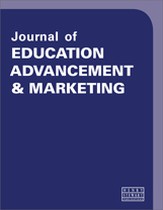Are there differences between traditional and nontraditional alumni donor motivations?
Abstract
Philanthropy is becoming increasingly more important as a means to ensure the current and future sustainability of small private colleges and universities. Donations from alumni comprise a large share of the private philanthropy received by institutions of higher education. In recent decades, an increasing number of students have earned degrees nontraditionally, by attending classes online or at distancelocation centres. This study sought to understand whether any differences exist among traditional and nontraditional alumni donors based on six categories of motivation: (1) social, recognition and reward; (2) belief in the institution; (3) self-fulfilment; (4) relational; (5) financial; and (6) obligation and responsibility. Additionally, the study examined four demographic variables (age, gender, marital status and children) to see whether any significant relationships exist between these variables and the six motivation categories. In general, our findings suggest that there are no significant differences between traditional and nontraditional alumni donor motivations. Age was found to impact the donor motivation categories of social, recognition and reward as well as the relational motivation category. Age and gender combined were found to be a significant predictor of the social, recognition and reward category. The results of this study may have practical implications for fundraisers at colleges with both traditional and nontraditional alumni donors.
The full article is available to subscribers to the journal.
Author's Biography
Stephen Kubasek is the Associate Vice President of University Advancement at Saint Leo University. He has served Saint Leo for nearly a decade in fundraising leadership roles with responsibility for parent fundraising, major gifts, planned gifts, grants and advancement services. Prior to Saint Leo, he worked for the Tampa regional office of a national nonprofit, managing volunteers, recruiting new members and raising annual gifts to support the organisation’s mission. He has also spent time as a volunteer in Honduras teaching English. Stephen is currently the president of Charitable Gift Planners of Tampa Bay and serves on the advisory board of the African Sisters Education Collaborative, housed at Marywood University in Scranton, Pennsylvania. Stephen holds a BA in Marketing, an MBA and a Doctorate of Business Administration from Saint Leo University. This paper is based on his doctoral research of traditional and nontraditional alumni donor motivation.
Russell Clayton is an Instructor in the Muma College of Business at the University of South Florida. His thoughts on business have been published in such journals as the Harvard Business Review and Human Resource Management. He has also been quoted by NBC, Fox News and Fast Company, among others. Prior to beginning his teaching career in higher education, Russell spent seven years in major gifts fundraising.
